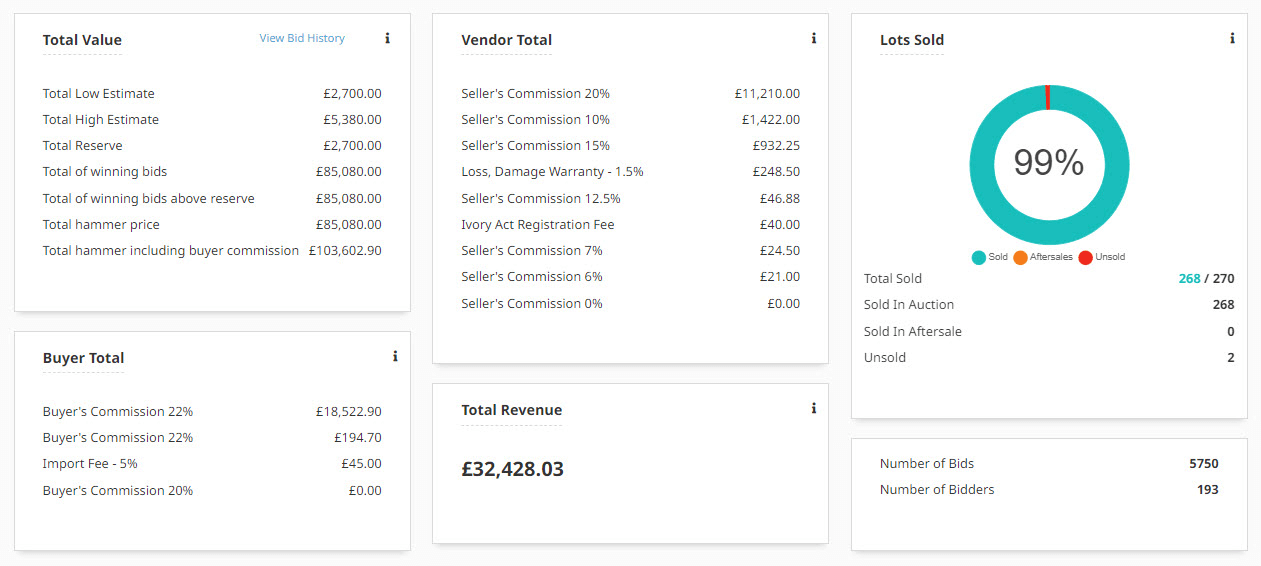
The Online Auction industry has grown significantly over the past few years as consumers migrate towards online purchases. This growth was helped significantly by the Covid-19 restrictions, forcing a shift to online sales for many auction houses.
Online Auctions became almost the only way to access the market, and many auctioneers had to up their game with many providing more choices by adding extra 3rd party platforms for the discerning consumer to choose from when bidding live online.
New to Auctions?
An auction means any sale made by competitive bidding. There are various types of auctions, but we will focus on the most common English Auction, also known as Open Ascending Auction. This is where a vendor/seller offers items for sale to achieve the best price by attracting numerous bidders to drive the price upwards.
Opening an auction house business provides an opportunity for vendors to consign goods to the highest bidder, with the auction house earning a percentage of the proceeds made. If you want to sell goods by auction, check with your local council whether you need to register your premises and obtain a license.
There are three main ways to bid at an auction; some bids, called absentee/commission bids, will be given to the auctioneer (usually during viewing days) to bid on the bidder’s behalf; others will choose the convenience of bidding online electronically using a live bidding platform, usually provided by a third party software provider to the auction house; and others may be bidding in the room.
Some items in the auction will have reserve prices set by the vendor after a discussion with the auctioneer, so the item may not be sold if the final bid is not high enough.
If the auction is a Timed Auction (Ebay model) and therefore not broadcast live, there is no auctioneer taking bids in a room. Each lot can be bid for online for a limited period of time, and the bidder who submitted the highest bid is the winning bidder, provided any reserve price has been met. These auctions generally last for a week or more, and bidding can start as soon as the auction is open on the auction house website.
In these auctions, bidders enter their maximum bid, and the system bids up to that amount in increments, bidding only enough to keep the highest bidder in the lead.
It’s now so easy to set yourself up to sell at a timed auction and a myriad of uses, including one-off charity auctions, art gallery sales, dealers’ surplus stock etc.
Bear in mind, when looking for a third-party live auction platform, that you are showcasing your auctions to the world, and the experience for the bidder should be seamless and enjoyable.
As well as deciding which type of auction/s you will be hosting, it is absolutely vital that you have a system in place that will support you and your team in the day-to-day running of your auction business. There are several on the market. You will need to review their offerings carefully to ensure they cover all aspects that the unique world of auctions requires to run efficiently and successfully whilst abiding by the most recent government directives.
For instance, most established auction houses will have several systems in place for procuring items for sale. This is a priority as without enough items to sell, there can be no auction, so utilising all the numerous and varied approaches for procuring stock is paramount.
One of the most convenient ways is to allow potential clients to access valuations online from your website, allowing them to upload images and a brief description. Alternatively, you can organise valuation days, which can be controlled very conveniently with an automated booking system, saving precious time and making sure that you don’t miss appointments and perhaps that item that will make headlines.
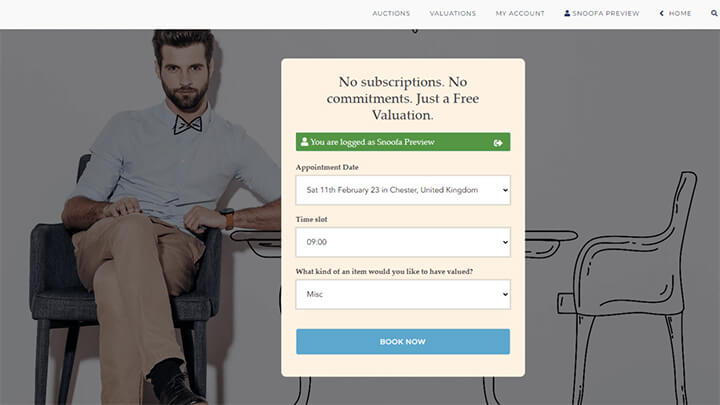
Booking a Valuation Day Appointment Online
Consideration should also be given to providing your clients with a convenient, secure account area where they can manage their valuation appointments, consignments, and purchases. Giving your clients control reduces your workload.
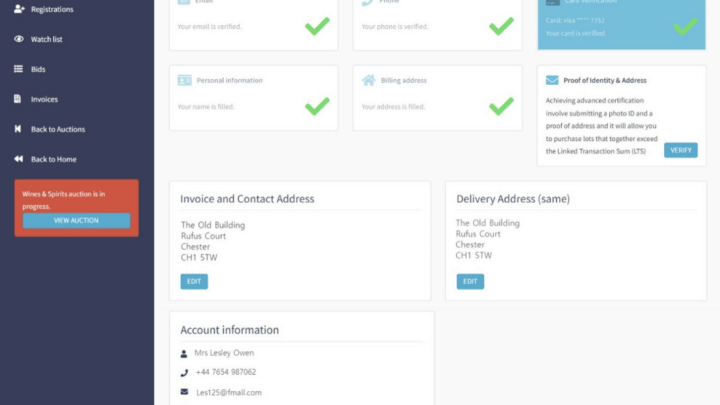
Client Zone Image
Once you have your consignments for auction, it’s advisable to have a comprehensive stock management system to keep track of all the items coming through your door; you’ll need to know which client they belonged to as a vendor before the auction and which bidder client they now belong to after the auction.
You will need to be able to find these items effortlessly to add them to auctions or mark them as unsold or paid for and collected.
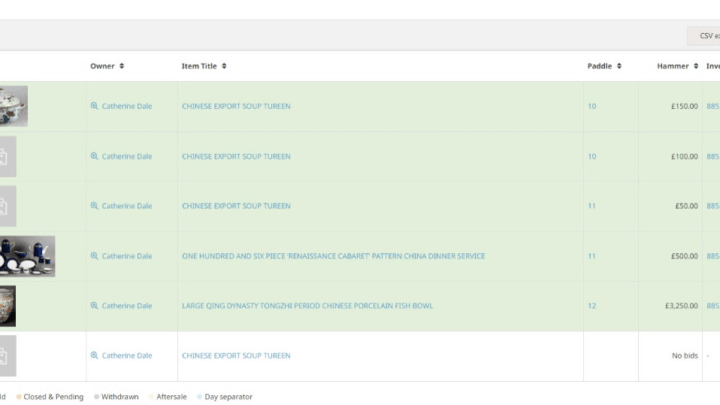
Auction Results
Reporting is also essential for the efficient running of your business. You are sending out consignment notes, pre-sale advice, settlement notices, invoices etc., not to mention marketing emails.
Last but by no means least, it will be vitally important now that you have your auctions running smoothly to gather business intelligence.
Your software should include the tools you need to help you understand and analyse your business’s performance.
Financial awareness is a critical part of tracking how your business is performing. Armed with this information, you can make important decisions that can mean the difference between a healthy company or failure.
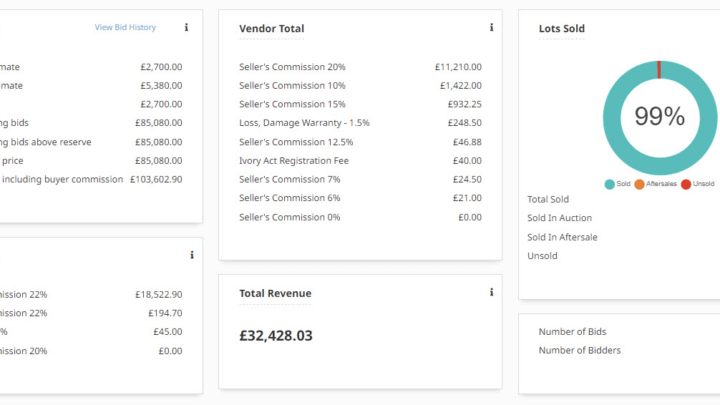
Financial reporting
If you are interested in running your own auctions, Snoofa is a great place to start. It is developed specifically to run auctions for auction houses, high-value dealers, galleries and other art market participants.
Its ease of use, while supplying every functionality, makes it the perfect solution for running your business and your auctions from start to finish.



